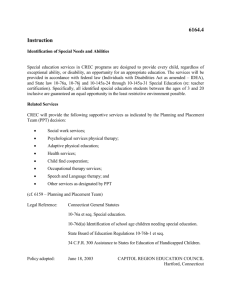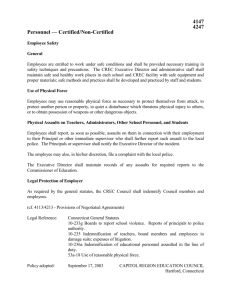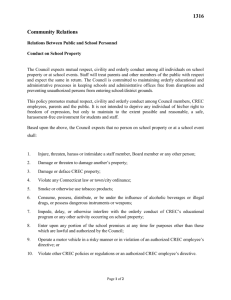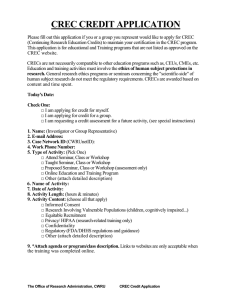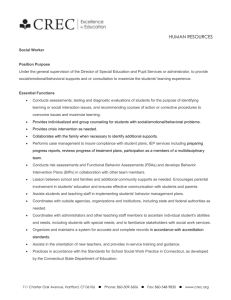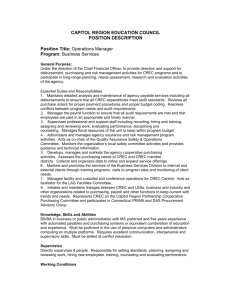Guidelines PDF (English) - Capitol Region Education Council
advertisement
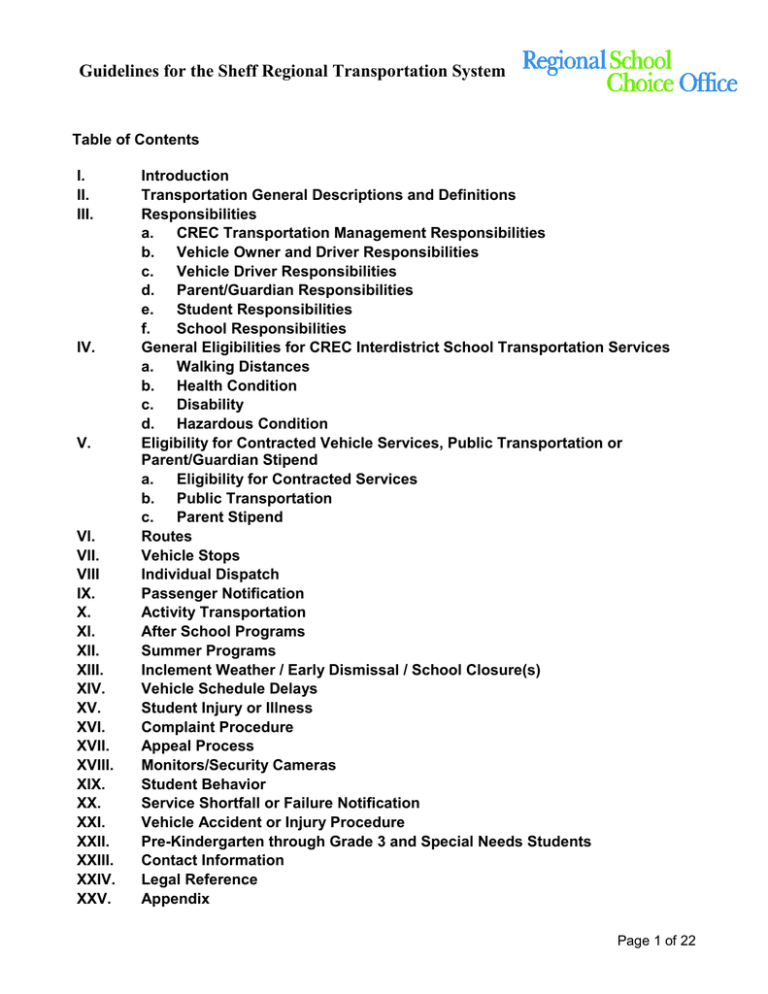
Guidelines for the Sheff Regional Transportation System Table of Contents I. II. III. IV. V. VI. VII. VIII IX. X. XI. XII. XIII. XIV. XV. XVI. XVII. XVIII. XIX. XX. XXI. XXII. XXIII. XXIV. XXV. Introduction Transportation General Descriptions and Definitions Responsibilities a. CREC Transportation Management Responsibilities b. Vehicle Owner and Driver Responsibilities c. Vehicle Driver Responsibilities d. Parent/Guardian Responsibilities e. Student Responsibilities f. School Responsibilities General Eligibilities for CREC Interdistrict School Transportation Services a. Walking Distances b. Health Condition c. Disability d. Hazardous Condition Eligibility for Contracted Vehicle Services, Public Transportation or Parent/Guardian Stipend a. Eligibility for Contracted Services b. Public Transportation c. Parent Stipend Routes Vehicle Stops Individual Dispatch Passenger Notification Activity Transportation After School Programs Summer Programs Inclement Weather / Early Dismissal / School Closure(s) Vehicle Schedule Delays Student Injury or Illness Complaint Procedure Appeal Process Monitors/Security Cameras Student Behavior Service Shortfall or Failure Notification Vehicle Accident or Injury Procedure Pre-Kindergarten through Grade 3 and Special Needs Students Contact Information Legal Reference Appendix Page 1 of 22 Guidelines for the Sheff Regional Transportation System I. Introduction These Guidelines were developed simultaneously with the Transportation Action Plan in order to implement a Regional Transportation System in accordance with the provisions of the April 2008 Sheff v. O’Neill Stipulation and Proposed Order and the requirements in its accompanying Comprehensive Management Plan (CMP) of December 2008. The primary goal for transportation in the CMP is as follows: “Plan and implement a regional transportation system, including sufficient funding mechanisms, which encourages and supports the participation of Hartford and suburban students in Sheff programming”. The Guidelines articulated in this document form the guiding principles for safe, effective and high-quality service delivery for Interdistrict Magnet Schools, Connecticut State Technical High Schools, Suffield Regional Agricultural Center and the Open Choice Program. The Guidelines for the Sheff Regional Transportation System; were reviewed and endorsed by the Sheff Transportation Committee, a committee which includes parents and representation from greater Hartford area superintendents, the Connecticut State Department of Education Sheff Office, the Regional School Choice Office, the Hartford Public Schools, the representative to the Sheff Plaintiffs, and the Capitol Region Education Council. If you have any questions or require clarification, please contact the CREC Transportation Office at 860-524-4077 Monday through Friday during the hours of 05:00 AM to 08:00 PM or at transportation@crec.org. Page 2 of 22 Guidelines for the Sheff Regional Transportation System II. Transportation General Descriptions and Definitions The Regional School Choice Office (RSCO) provides interdistrict school transportation services1 to eligible students in Grades Pre K 2 through Grade 12 who attend any of the following school choice programs in accordance with the provisions of the April 2008 Sheff v. O’Neill Stipulation and Proposed. These services are managed by the Capitol Region Education Council (CREC). • Students participating in the Open Choice program: (a) Hartford resident students who attend Open Choice schools in suburban towns and (b) Students who reside in suburban towns and attend Open Choice schools in Hartford; • Students attending Magnet Schools: Hartford and suburban students who are not already receiving interdistrict transportation by their resident municipalities; • Hartford resident students who attend the Suffield Regional Agricultural Center at Suffield High School; • Hartford resident students who attend any of the following Connecticut Technical High Schools: Cheney, Goodwin and Vinal; and • Students residing in suburban towns who attend A. I. Prince Technical High School in accordance with the requirements of C.G.S. Section 10-97 3. The Hartford Public Schools provides intradistrict transportation for Hartford students who attend Magnet Schools located in Hartford. Interdistrict transportation to Magnet Schools is also provided by municipalities in the Greater Hartford Region. Definitions “Capitol Region” means the geographic area of the State of Connecticut that includes public school districts served by RSCO. Please see Appendix A for a list of the school districts served by RSCO. “Transportation Zone” means one of the designated geographic areas comprising the Capitol Region. “Regional School Choice Office” (RSCO) means an entity established by the State Department of Education (CSDE), which includes personnel from the Hartford Public Schools (HPS), the Capitol Region Education Council (CREC) and the Sheff Plaintiffs. 1 Interdistrict School Transportation Services range from a parent stipend to municipal bus passes to contracted transportation services. 2 3 State law does not mandate transportation of Pre-K Students. Transportation to Regional Agricultural Science and Technology Programs and CT Technical High Schools may differ in some areas because the eligibility for services is established by statute. Page 3 of 22 Guidelines for the Sheff Regional Transportation System Definitions (continued) “Regional School Transportation System” means a RSCO coordinated system of transportation that supports the participation of students in school choice programs in the greater Hartford region through increased routing efficiency and minimized ride times. “Transportation” or “Interdistrict School Transportation Services” means a service by which a student is conveyed over public roads to and from school, using CREC owned, leased or contracted services, public transportation or other appropriate means (e.g., a parent stipend). “Pre K” means programs for three- and four-year-old students (student is three- or four-years-old by December 31 of the school year of enrollment). “Grade K” means Kindergarten or any school program appropriate for a beginning student (student is five-years-old by December 31 of the school year of enrollment). “Special Education” refers to a program in which students with disabilities qualify to receive special education services in accordance with the Individuals with Disabilities in Education Act. “Disability” means a permanent or semi-permanent condition or illness impacting an individual student, such that transportation is provided to avoid unreasonable burden or hazard to the student. “Vehicle Stop” means locations designated for students to enter and exit transportation vehicles and/or transfer between transportation routes. “Neighborhood Stop” means locations designated for students to enter and exit transportation vehicles that are usually assigned to two or more intersecting streets with not having any known hazardous conditions. “Central Stop” means locations designated for students to enter and exit transportation vehicles that are usually assigned to public locations, such as schools or libraries and in some cases large shopping complexes with not having any known hazardous conditions. “Transfer Stop” means locations designated for students to enter and exit one transportation vehicle to another transportation vehicle that are usually assigned to public locations, such as schools or libraries and in some cases large shopping complexes with not having any known hazardous conditions. “Walking Distance” means the prescribed RSCO Transportation pedestrian route between the student’s residence and the student’s assigned school or vehicle stop. Walking distance will be measured from the closest point of the school grounds or vehicle stop to the student’s home where the public street meets the closest point of the driveway or walkway. “Sidewalk/Walkway” or “Designated Walk Area” means a portion of the landscaped right of way, usually parallel to traffic lanes designated for walking. It may be paved or unpaved, a public right of way, or a delineated path or designated walk area alongside of a road. Page 4 of 22 Guidelines for the Sheff Regional Transportation System Definitions (continued) “Hazardous Condition” means an object, condition or set of conditions that is likely to negatively affect the safety of students. “General Adjustments” means when a change request is submitted for request to change vehicle stop assignment, route time change or any other requests that are not of an urgent matter. “Bus Monitor” means a trained CREC Staff member who provides supervision on an assigned vehicle for student behavior and activities so to assure a safe transport. “School Messenger” means an automated notification process in which parents or guardians are notified when bus delays occur. “Medical Documents” means providing a written description annually or per incident of a students’ medical condition as issued by the physician that requires an alternative bus stop location. “Two-Way Radio”, means a permissible form of communication between the bus driver and dispatcher. This can be used during transit as it is defined as part of the bus. “Early Dismissals” means when schools have scheduled early dismissals or instances when schools determine early dismissal is warranted, parents/guardians are responsible for obtaining this information from the receiving school when scheduled and from the local media outlets for unscheduled instances. “Joint Custody” means when the parents / guardians have joint custody of their student or students and their residence is shared between two different addresses. Page 5 of 22 Guidelines for the Sheff Regional Transportation System III. Responsibilities a. CREC Transportation Management Responsibilities • Develop safe and efficient routes for students in accordance with these guidelines. • Offer a timely and courteous response to constituents groups (students, parents, districts, program managers, contracted vendors, others) when inquiries, concerns and problems arise. • Ensure vehicle performance and, in particular, as it pertains to safety, ride time, efficiency and service to children and families. • Provide professional development for staff members, as needed (e.g., bus monitors, customer service personnel). • Monitor and investigate potential hazardous conditions parents/guardians and/or school officials have identified. based on appeals which b. Vehicle Owner and Driver Responsibilities The following represent several of the main responsibilities of vehicle owners and drivers. Vehicle Owner/Contractor Responsibilities: • Fully responsible for the care and supervision of students during transportation. The transportation of a student begins when such student makes physical contact with the vehicle and ends when the student has departed the vehicle at the designated place. • Ensure that all vehicles and other equipment are in compliance with current school transportation vehicle laws, rules, regulations and policies of federal, state and local governments. • Maintain all vehicles so as to ensure proper starting, good visibility and safe operation during all types of weather. • Take the highest degree of care in recruiting and selecting vehicle drivers after performing background checks so to ensure that all personnel employed are familiar and comply with current school transportation vehicle laws, rules, regulations and policies. • Provide an ongoing program of classroom and road training to assure continued state certification of all vehicle drivers in accordance with federal, state and local laws, rules and regulations. • Conduct a school vehicle safety program consisting of monthly meetings with vehicle drivers to address, in part, driver responsibility and procedures. CREC is permitted to actively participate in the school vehicle safety program including, the setting of agenda items such as student behavior management and emergency procedures. • Employ a qualified “Driver Trainer” who will travel each route with the assigned vehicle driver at least once a year to survey not only the vehicle driver’s performance but also route hazards and equipment efficiency. At the end of each month, the Contractor will provide CREC with a report pursuant to these requirements. The Driver Trainer must also perform random road checks upon CREC’s request and submit written reports. Page 6 of 22 Guidelines for the Sheff Regional Transportation System c. Vehicle Driver Responsibilities (General): • Always follow the general instructions for route designations. • Transport only the designated passengers on the route, except for special permission issued through CREC Transportation or issued written permission slip from the receiving school. • Perform the route exactly as shown on the route sheet, except when road detours, emergency situations or dangerous road conditions prevent the route from being followed as designed. • Remain on the vehicle at all times that students are on the vehicle. • Not alter the route schedule(s), stop location(s) or route time(s) without written permission from CREC Transportation. • Always stop at each scheduled bus stop location as in accordance with the route schedule. Contact the dispatcher to report zero loads when a stop is vacant. • Not leave a vehicle stop if students are in sight and making an effort to reach the vehicle, unless school/CREC officials have suspended these students from the vehicle. • Not permit dangerous/hazardous materials on the vehicle. • Report all unsafe conditions to the vehicle owner/company who, in turn, reports these conditions immediately to CREC Transportation Office. Vehicle Driver Responsibilities (Students): • Drivers are responsible for maintaining order and discipline on the vehicle as trained. The driver should always: See that all students are seated and remain seated while the vehicle is in operation. Stop the vehicle in a safe place to address a discipline issue. Report discipline issues to the school and CREC in a timely manner using a Student Conduct Report. Never use profane language or physical contact to control disruptive students. Refrain from escalating a confrontation and arguing with students, parents, or school officials. If the disruption being caused is such that it makes driving the vehicle hazardous, the driver must contact the vehicle owner/company for direction. The vehicle owner/company will advise the driver to return to the school or call for police assistance. In the event of an emergency or serious offense, CREC Transportation must also be contacted. Grades Pre K-3 students will not be released from the vehicle without appropriate supervision (please see page 8). If there is no one to meet the student, the student is to be kept on the vehicle and the vehicle owner contacted immediately, who will, in turn, contact CREC to make proper arrangements. If proper arrangements cannot be made for the student, then he/she is to be taken to the location as designated by CREC. Page 7 of 22 Guidelines for the Sheff Regional Transportation System d. Parent/Guardian Responsibilities • Parents/guardians must maintain current contact information, including emergency contact information and telephone numbers, with the CREC Transportation Office and the school. • Ensure the safety of the student until the student enters the assigned vehicle at the designated location. • Ensure the safety of the student once the student leaves the vehicle, returning from school. • Review with his/her child any safety rules in the school’s student handbook and also the following safety rules: walk facing traffic and look both ways before crossing the roadway; wait off the roadway so as not to impede traffic flow; and behave responsibly at the vehicle stop and on the vehicle. • Parents/Guardians are required to be at the assigned stop location(s) 10 minutes before the scheduled time and be prepared to wait up to 10 minutes after the scheduled time. In the event that the vehicle has not arrived after the 20 minute window, then the CREC Transportation office should be contacted, either by calling 860-524-4077 or by electronic correspondence at transportation@crec.org. Students in Grades Pre K-3: Parents, guardians, or designated caregivers must be at the vehicle stop with students. If a parent, guardian, or designated caregiver is not at the vehicle stop for the afternoon drop off, actions to intervene will be taken for repeated offenses, up to, but not limited to, a referral to the local authorities. Students in Grades 4-8: It is recommended that an adult be present to supervise at the designated locations. Students must remain outside and not be in close proximity to the road. • Notify CREC as soon as possible if there is an address change, a change in contact person(s), phone numbers or any other personal changes that could affect transportation services. e. Student Responsibilities When waiting for a vehicle: • Students are required to be at the assigned stop location 10 minutes before the scheduled time and be prepared to wait up to 10 minutes after the scheduled time. In the event that the vehicle has not arrived after the 20 minute window, then the CREC Transportation office should be contacted, either by calling 860-524-4077 or by electronic correspondence at transportation@crec.org. • Please wait until the vehicle comes to a full stop before approaching it. Page 8 of 22 Guidelines for the Sheff Regional Transportation System Student Responsibilities (continued) • Cross in front of the vehicle when the “stop on signal” lights are activated. If it is a divided street, use a designated crosswalk, since opposing traffic is not required to stop when “stop on signal” lights are activated. • The school bus does not have bathroom facilities and cannot make any stops. The student should prepare accordingly prior to boarding the bus. While on the vehicle: • Follow the driver’s and monitor’s instructions. Respect the vehicle driver, monitor, and other students. Observe and follow the rules when riding on the vehicle. • Eating is not permissible at any time while riding on the school bus. When leaving the vehicle: • Exit the vehicle in an orderly fashion; do not crowd the vehicle exits. Walk away from the vehicle; do not loiter at the vehicle stop. Wait until the vehicle pulls away before walking in the roadway. When students are not adhering to vehicle rules, a Student Conduct Report will be submitted by the Vehicle Driver or Monitor to the school program administrators and CREC Transportation. Consequences range from discussions with school administrators and guardians to improve student safety to suspension, up to and including removal, from vehicle transportation for more serious offenses. f. School and District Responsibilities Communication and Coordination Schools should designate a contact person who can make decisions about transportation matters and collaborate with CREC Transportation in activities including: • providing regular updates to the CREC Transportation Office regarding school calendars, schedules, bell times, student rosters, parent/guardian current contact information, special transportation needs, late activity vehicle needs, and similar logistics; • assisting CREC Transportation with providing school drop-off and pick-up times and locations; • reviewing school transportation guidelines (e.g., student handbook) with students and CREC personnel; • receiving communications from the CREC Transportation Office and RSCO and disseminating such information to school personnel, students and parents as appropriate; • working with CREC Transportation and CREC Open Choice/Magnet personnel (e.g., intervention specialists, bus monitors) to resolve student transportation disciplinary incidents; and Page 9 of 22 Guidelines for the Sheff Regional Transportation System School and District Responsibilities (continued) • submit late bus requests by 11:00 AM for same day service by use of the Late Bus Request Form as found on the CREC website at http://www.crec.org/transportation/forms. Late buses can be scheduled for arrival any time after 4:30 PM. • submit field trip requests with minimum of five days prior to the trip date. The Transportation Office will solicit quotes from two or more transportation vendors if the trip is requested at least 5 days in advance. The trip will be booked with the first available vendor if the request is received with less than five days’ notice. • offering CREC Transportation (a) regular feedback on vehicle owner/driver and CREC service delivery and (b) recommendations to enhance service. • receiving schools are responsible to supervise and/or care for students when the students are detained at school because of a transportation problem. • the receiving schools are required to administer emergency evacuation drills and should coordinate with CREC Transportation. Student/Family Orientation It is recommended that schools annually host, in collaboration with CREC Transportation, orientation programs for students, parents and guardians participating in this transportation program. Such orientation programs may include a review of established routes, bus stop schedules, school arrival times, student behavior standards, safety considerations, the process for presenting complaints, the appeal process and other topics included in these guidelines. IV. General Eligibility for RSCO Interdistrict School Transportation Services Students assigned to attend schools in the choice programs described on page 3 (Open Choice, Magnet, Connecticut Technical High Schools and Regional Agricultural Science and Technology Programs) are eligible to receive some form of interdistrict school transportation service: parent/guardian stipend, public transportation or a contracted vehicle (e.g., school bus, van or livery service) based on the following parameters: a. walking distance to and from school; b. student health condition ; c. student disability; and/or d. street/roadway hazardous condition. a. Walking Distance 4 Students are eligible for CREC interdistrict school transportation services based on the following general guidelines: 4 Walking distances are guidelines as published by the Connecticut General Assembly 97-R-1438. Page 10 of 22 Guidelines for the Sheff Regional Transportation System Walking Distance (continued) • Grades Pre K through 3: Student resides one mile or more from his/her assigned stop or school. • Grades 4 through 8: Student resides one and one half miles or more from his/her assigned stop or school. • Grades 9 through 12: Student resides two miles or more from his/her assigned stop or school. • If a child is assigned to a central stop that exceeds the permissible walking distance, parents or guardians are responsible for the child’s arrival and departure from the central stop. Transportation for Pre K students is only provided to those Hartford students attending suburban magnet schools. b. Health Condition For a special stop request due to a student health condition, the RSCO Special Transportation Request Form must be filled out by the parent/guardian and attending doctor. This form is available on the CREC Transportation website at www.crec.org/transportation or by calling the CREC Transportation Office. RSCO will review each request and determine if an accommodation will be made or if the student qualifies for transportation through an Individualized Education Program or a Section 504 plan. • For any students assigned to use central stops, no special stop arrangements will be considered. c. Disability A student with a disability or a Section 504 plan will receive required transportation services from their home district in accordance with his Individualized Education Program and/or Section 504 Plan. d. Hazardous Condition Any public street or road shall be deemed hazardous when any one of the following conditions exists: • For students enrolled in Grades Pre K through 3, the absence of sidewalks on at least one side of the street or raised walk areas or the absence of pedestrian crossing lights or crossing guards where three or more streets intersect, and at street crossings where there are no stop signs or crossing guards and the traffic count during the time that students are walking to or from school exceeds sixty (60) vehicles per hour. • For students enrolled in Grades 4 through 12, the absence of a traffic light or stop signs or crossing guard where three or more streets intersect and has a traffic count which exceeds ninety (90) vehicles per hour during the time that students are walking to or from school. • For all students, any street, road or highway with speed limits in excess of forty (40) miles per hour which do not have pedestrian crossing lights or crossing guards or other safety provisions at points where students must cross going to or from school or the vehicle stop. Page 11 of 22 Guidelines for the Sheff Regional Transportation System Hazardous Condition (continued) • For all students, any street, road or highway that does not have sidewalks or raised walk areas and does not have a minimum width of twenty-two (22) feet available to vehicles or a minimum width of twenty (20) feet available for vehicles under snow conditions. • For all students, the usual or frequent presence of a nuisance or dangerous condition at times that students would be present, such as: criminal activity; adult type businesses/adult entertainment; open man-holes; construction; loading zones where delivery trucks are permitted to park on walk ways at the time that students are present; commercial entrances and exits where cars cross walking areas at excessive speeds; and unfenced, barricaded or unguarded railroad tracks, railroad crossings, culverts, lakes, ponds, ditches, streams or bridges. • In the event that a student has been assigned to a central stop (please see page 15 for additional information), parents/guardians should arrange for transportation to these locations. V. Eligibility for Contracted Vehicle Services, Public Transportation or Parent/Guardian Stipend • eligibility for contracted vehicles services; • public transportation; • parent stipend; a. Eligibility for Contracted Vehicle Services Eligibility for contracted vehicle services (e.g., school bus, van or car) is based on the general eligibility criteria described above, resident town location, proximity to Hartford, number of stops on routes and route ride time, number of students on vehicles, and cost effectiveness. In general, contracted vehicle service is available to all towns in the Capitol Region. Please see Appendix A for a list of these towns. Contracted vehicle service from towns outside of the Capitol Region to choice schools is based on the number of participants from these towns, distance, number of route stops and route time, and the State reimbursement for associated costs. In some cases, a parent/guardian may need to drive his/her child to a nearby town to receive vehicle service to a choice school. Please see the Bus Stops section on page 14 and 15 for more information. Every effort will be made to provide transportation services so that students in the Greater Hartford Region may attend choice programs. Page 12 of 22 Guidelines for the Sheff Regional Transportation System b. Public Transportation Connecticut Transit passes are an option for some students in the middle and high school grades who meet the general description as described on page 3 and general eligibility criteria described on pages 10-11 and who live in towns contiguous to Hartford. CREC Transportation will need to determine if Connecticut Transit stops are in close proximity to schools and if service extends into the late afternoon so that students may participate in school extended-day programs. Please see Appendix B for a list of towns that became eligible for this service in 2011-2012. Currently, Open Choice students attending the following schools receive Connecticut Transit Fare Cards: • Conard High School in West Hartford; • Hall High School in West Hartford; • Sage Park Middle in Windsor; • Windsor High School in Windsor CT Transit Procedures: Annual Distribution Schedule: • Student City Transit (10 Ride) fare cards will be distributed at the CREC Transportation Office, 155 Wyllys Street, Hartford, CT 06106, in the fall and spring. Please contact the CREC Transportation Office at 860-524-4077 or www.crec.org for more information. In order to receive a new Connecticut Transit Fare Card, it is required to return the Connecticut Transit Fare Card received from the prior term. c. Parent/Guardian Transportation Reimbursement In the event that a student meets the general eligibility criteria described on page 10 and 11 but a contracted vehicle service or a CT Transit pass is not an option, a parent reimbursement may be provided to help parents/guardians to transport their children to choice programs and for Pre-K students not eligible to receive transportation. Please contact your choice school's main office or www.choiceeducation.org to receive the necessary forms and more information. • For any parents/guardians submitting for the daily reimbursement where they transport their student for the entire school year, they must submit using the on-line webform located at http://www.crec.org/transportation/transportation_stipend_form.php no later than May 31, annually. Page 13 of 22 Guidelines for the Sheff Regional Transportation System VI. Routes In approving transportation routes, the CREC Transportation Office will consider the following conditions which minimize the following: • • • • the risk of potential hazardous conditions; student ride times; The range of student grade levels per vehicle; The transportation costs In addition, the CREC Transportation office will also consider ways in which to maximize capacity, vehicle utilization and efficiency indicators. Supporting continued safety standards, routes under contract with CREC on behalf of the Regional School Choice Office are restricted from using the stretch of Route 44 (Avon Mountain Road) that traverses over Avon Mountain. Alternate routes must be used to transport students to destinations in the area of the Avon Mountain. All efforts will be made to plan bus routes that have an average ride time of 60 minutes or less, but no route may result in average student ride times in excess of 90 minutes per run. Vehicle routes will be developed so that the AM and PM stop assignments are consistent. Periodically bus routes may require changes to the bus stop time. When this occurs parents/guardians will receive verbal notification from the CREC Transportation office. Parents/guardians must maintain current contact information, including emergency contact information and telephone numbers, with the CREC Transportation Office and the school. Vehicle route efficiencies are achieved when best practices are used and in most cases when the PM routes are performed in the reverse order of the AM routes. For bus seating capacity; no route may result in more than two Pre-K students with car seat per seat, no more than three Grade K through 8 students per seat and no more than two Grade 9 through 12 students per seat. No route will be planned that requires a vehicle to travel backwards at any time. Dead end streets and cul-de-sacs will be avoided to the extent reasonably possible. Where student population or other conditions do not warrant establishing a route, alternative arrangements may be made with approval of the RSCO Transportation Office, including reimbursement for public transportation or reimbursement for transportation to a parent or guardian or student of majority age, or transportation from a nearby municipality. Page 14 of 22 Guidelines for the Sheff Regional Transportation System VII. Vehicle Stops The CREC Transportation office will identify and assign all bus stops and routes. For all regular scheduled routes, students must use the same AM Stop Location for each day of the school week and students must use the same PM Stop Location for each day of the school week. The AM and PM Stop maybe of different locations, but are required to remain the same for each day of the school week. Use of Daycare locations for either AM or PM stops must be within the residing district of the student. CREC transportation vehicle contractors will pick up and discharge students only at CREC approved vehicle stops. CREC Transportation vehicle contractors are not permitted to stop during the bus route allowing students the use of any public restroom. Only those parents, guardians or designated caregivers with Pre-K students being transported are allowed to board the bus. For all others this is not permissible. CREC Transportation will establish Vehicle stops at locations that are free of Hazardous Conditions and that are reasonably comfortable and convenient for students to await transportation, which could include; neighborhood stops, centrally located bus stops and shuttle transfer stops. When circumstances warrant because of joint custody and resulting in students to utilize more than one bus stop, parents / guardians most submit to CREC a custody agreement as issued by the courts. Central Stops are created; 1) Central Bus Stops will be created for all new transportation services including new schools, new programs, or new transportation service areas. 2) When student density for a specific route cannot comply with the student average ride time or in order to support a sending districts student population for enrollment to one or more schools. In most instances, Central Stops are created for new transportation services. Central Stops are usually assigned to public locations, such as schools or libraries and in some cases large shopping complexes that comply with having no known safety and hazardous conditions. When CREC transportation uses central stops or shuttle transfer stops: • • • • Safety and accessibility factors will determine the selected central/shuttle stops. Parent/Guardians will arrange for students to arrive at the designated shuttle/central stop. Consideration will be made to ensure equal access. For home stops requested because of an existing medical condition, see requirements under section IV-General Eligibility for RSCO Interdistrict School Transportation Services, subsection b. Health Condition. CREC Transportation will establish Vehicle stops other than shuttle transfer and central stops using the following guidelines which allow the following maximum walking distances (Note: These may differ from some districts). • • • Students enrolled in Grades Pre K through 3 - one mile or less from their assigned bus stop; Students enrolled in Grades 4 through 8 - one and one half miles or less their assigned bus stop; Students enrolled in Grades 9 through 12 - two miles or less from their assigned bus stop. Page 15 of 22 Guidelines for the Sheff Regional Transportation System Vehicle Stops- (continued) • For students residing further than the permissible walking distances, parents or guardians are responsible for the child’s arrival and departure from the central stop. VIII. Individual Dispatch A separate vehicle will be dispatched for an individual student by CREC Transportation only when it is confirmed that the assigned vehicle did not adhere to the assigned route and the student was not picked up at their assigned stop location. IX. Passenger Notification Student rosters will be distributed to the CREC Transportation no later than July 1st by the receiving districts so that CREC Transportation can develop routes and bus stop assignments for eligible students. Parents/guardians will be notified by CREC Transportation of student vehicle stop assignment, including arrival and departure times during the month of August each calendar year. Parents/guardians may request adjustments to student assignments by calling CREC Transportation at 860-524-4077 or by submitting a written request to the CREC Transportation Office or requests may be made online at www.crec.org. CREC Transportation will make requested adjustments on a case by case basis and generally may take up to five (5) business days to process. Every effort will be made to provide the parents/guardians altered bus stop information before the first day of school. (Note: Annually during the month of September and October change requests may take longer to process). No general adjustments will be made between August 15 and September 30. These will be processed in the order received and after the priority adjustments are completed. No general adjustments will be made after May 31st for the current school year. CREC and RSCO will post transportation information, vehicle stop assignments and times on their websites. CREC Transportation will accommodate on a case by case basis students who enroll or change residence after June 15 of each calendar year. The CREC Transportation Office will make every effort to provide prompt notification to parents/guardians of all traffic accidents, route and time changes, delays, cancellations and similar incidents or events involving that parent/guardian’s student. In many instances this will be completed by use of the School Messenger Alert System. Parents/guardians must provide CREC Transportation and the school with current contact information, including emergency contact information telephone numbers. The CREC Transportation Office will operate a call center daily during the hours of 05:00 AM to 08:00 PM to provide information and answer questions for parents/guardians and school officials by calling 860524-4077 or by electronic correspondence at transportation@crec.org. Page 16 of 22 Guidelines for the Sheff Regional Transportation System X. Activity Transportation When at least two (2) or more students per school participate in after-school activities then Transportation Services will be provided after normal school hours. Generally these are not available to commence until 4:30 PM, Monday – Friday. In some instances students may be dropped off at centralized locations. These locations may exceed the walk distance guidelines. If this occurs, parents/guardians may need to make arrangements for additional transportation. The receiving school must submit an order for the activity bus, including a list of students, by submitting the Late Bus Request Form as found on the CREC website at http://www.crec.org/transportation/forms daily to the CREC Transportation office by 11:00 A.M for each day of request. The CREC Transportation office may establish additional services when it determines that it can be provided economically. Activity transportation is not subject to the Appeal process. XI. After School Programs CREC Transportation will provide transportation for those students that participate in daily after school programs that are located more than one half mile from their attending school and within their sending district. Transportation from after school programs will not be provided. Parents/guardians who desire transportation to after school programs must authorize the arrangement and submit in writing to the CREC Transportation Office. After School Programs drop off are not subject to the Appeal process. XII. Summer Programs When student(s) are provided transportation for summer programs, in most instances students will be assigned central stops. These locations may exceed the walk distance guidelines. If this occurs, parents/guardians may need to make arrangements for additional transportation. Summer Programs are not subject to the Appeal Process. XIII. Inclement Weather/Early Dismissal/School Closure(s) Receiving schools are responsible to immediately notify the CREC Transportation Office and the local media outlets of school closures, delayed openings and early closings. Parents/Guardians are responsible for obtaining this information from the local media outlets. Students will not receive transportation in the event of closure of the student’s assigned school or when closure of the students home district because of inclement weather or similar emergency condition. Transportation cancellations under this section are not subject to the Appeal process. Page 17 of 22 Guidelines for the Sheff Regional Transportation System XIV. Vehicle Schedule Delays In some instances transportation may be delayed when there are delayed openings of a student’s assigned school, during inclement weather, possible vehicle mechanical deficiencies or traffic incidents. When incidents occur other than inclement weather, an automated message will be sent to the parent/guardians of the student(s) route that has been delayed using School Messenger. Parents/guardians must provide CREC Transportation and the school with current contact information, including emergency contact information telephone numbers. Transportation delays under this section are not subject to the Appeal process. XV. Student Injury or Illness In the event students who are injured or become ill during the school day, the receiving school is responsible for notifying the student’s parent/guardian of the problem and make arrangements for the parent/guardian or designee to transport the student from school. XVI. Complaint Procedure Parents/Guardians who wish to submit a complaint can do so by either calling the CREC office at 860524-4077and speak with one of the transportation assistants who will record their information or send an email to transportation@crec.org or the parent/guardian can go to the CREC website at www.crec.org and select the link under Forms and fill out the Complaint Form. All submitting complainants will be contacted within 24 hours and in many instances, their issues will be addressed and resolved within 48 hours. XVII. Appeal Process Any parent, guardian or student of majority age may submit an appeal of eligibility and bus stop determinations by submitting a written document to the CREC Transportation Office at 111 Charter Oak Avenue, Hartford CT 06106 detailing the reasons for the appeal. The Transportation Office will address the appeal promptly and issue a written decision. If the matter is not resolved to the satisfaction of the appealing party within 10 business days of receipt by the CREC Transportation Office, a further appeal may be made by delivering a letter to RSCO detailing the reasons for the appeal. The RSCO will hear the appeal and address promptly and issue a written decision within 10 business days In addition, any parent, guardian or student of majority age who believes they have been aggrieved by the RSCO decision may then submit an appeal to the State Department of Education in accordance with State of Connecticut Statutes. Page 18 of 22 Guidelines for the Sheff Regional Transportation System XVIII. Monitors/Security Cameras/Two Way Radios CREC will assign qualified adult monitors to all vehicles based on the needs of a route which transports the following group of students; 1. Any Pre K Students. 2. When there are students enrolled in elementary and high school and are transported on the same bus. 3. When there is a scheduled transfer bus within the route. All vehicles with the capacity of transporting greater than 10 students will operate security cameras. As a general practice while transporting students, the bus companies will operate GPS locator systems in accordance with contractual agreements. As a general practice while transporting students, communication may take place between the driver and dispatcher to ascertain information or report existing conditions by use of two way radio. XIX. Student Behavior Transportation is a privilege extended to students on the condition that they behave appropriately. Students are subject to the behavior standards of their receiving school while awaiting transportation and during transportation. A Transportation Incident Report will be submitted by the vehicle driver to the administration of the receiving school within 24 hours of any student disciplinary offense, with a copy to the CREC Transportation Office. Based on the behavior standards and procedures of the receiving school, administrators in the receiving schools may suspend or expel students from CREC transportation services. School administrators may suspend or expel students from CREC transportation services any student whose conduct while awaiting or receiving transportation services to or from school that endangers persons or property. Administrators in receiving schools must notify the CREC Transportation Office and the student’s parent/guardian of all suspensions or expulsions from transportation services. CREC Transportation will not provide alternate transportation to students whom their receiving schools have suspended or expelled from CREC transportation services. Disciplinary suspension of transportation service is not subject to the Appeal process under this policy. Page 19 of 22 Guidelines for the Sheff Regional Transportation System XX. Service Shortfall or Failure Notification In the event of a service shortfall or failure, the bus company must immediately provide the CREC Transportation Office with a complete verbal report of the shortfall or failure. The verbal report shall be followed with a written Transportation Shortfall/Failure Report submitted to the CREC Transportation Office within 24 hours of the shortfall or failure. The CREC Transportation Office will immediately notify the parent/guardian and receiving school administration of the receiving school of all service shortfalls or failures involving the safety or convenience of students. The CREC Transportation Office will review each Transportation Shortfall/Failure Report for possible corrective action. Where it appears that corrective action is appropriate, the CREC Transportation Office will make the appropriate referral for action within ten (10) days of receipt of the Shortfall/Failure Report. XXI. Vehicle Accident and Injury Procedures Bus companies must immediately provide the CREC Transportation Office with a complete verbal report of all accidents, injuries and similar unusual incidents involving students, staff, parents/guardians or members of the public. The verbal report shall be followed with a written Transportation Incident Report submitted to the CREC Transportation Office within 24 hours of the incident. The CREC Transportation Office will immediately notify the parent/guardian and school administration of the receiving school of all incidents involving the safety of students. Parents/guardians must maintain current contact information, including emergency contact information telephone numbers, with the CREC Transportation Office and the school. The CREC Transportation Office will review each Transportation Incident Report for possible corrective action. Where it appears that corrective action is appropriate, the CREC Transportation Office will make the appropriate referral for action within Ten (10) days after receipt of the Incident Report. XXII. Pre-Kindergarten through Grade 3 and Special Needs Students For students in Grade Pre K through grade 3 and special needs students whose Individual Education Plans so specify, parents/guardians must have designated caregivers, who are present at vehicle stops in order to receive the students leaving vehicles at the end of the day. At the end of the school day, when a parent/guardian or a designated caregiver is not present at the vehicle stop to receive their child or children (Pre K through Grade 3 and/or Special Needs) then the vehicle driver may return the child or children to the receiving school or take the child or children to the local police department or other appropriate curator. Parents/guardians who fail to receive their students may be subject to denial of transportation services, referral to appropriate agencies or other corrective action. Bus Companies will notify the CREC Transportation Office for instructions if a parent/guardian or designated caregiver is not present to receive a student at the end of the day. Page 20 of 22 Guidelines for the Sheff Regional Transportation System XXIII. Contact Information CREC Transportation 111 Charter Oak Avenue Hartford, CT 06106 Office: (860) 524-4077 Fax: (860) 524-4005 Email: Transportation@crec.org CREC Website www.crec.org XXIV. Legal Reference: Connecticut General Statutes Section 10-186 Connecticut General Statutes Section 10-97 Connecticut General Statutes Section 10-187 Connecticut General Statutes Section 10-220 Connecticut General Statutes Section 10-221 Connecticut General Statutes Section 10-223 Connecticut General Statutes Section 4-176e to 181a Guidelines adopted: April 30, 2010 Sheff Transportation Committee Hartford, Connecticut Revisions Revision I- April 12, 2011 Revision 2- October 24, 2011 Revision 3- August 7, 2012 Revision 4- June 9, 2014 Revision 5- June 30, 2015 Revision 6- January 4, 2016 Page 21 of 22 Guidelines for the Sheff Regional Transportation System XXV. APPENDIX Appendix A (Referenced on Page 12) State of Connecticut School Districts Served by RSCO Transportation. Andover Avon Berlin Bloomfield Bolton Bristol Burlington Canton Coventry Cromwell East Granby East Hartford East Hampton East Windsor Ellington Enfield Farmington Glastonbury Granby Hartford Hartland Harwinton Hebron Manchester Marlborough Middletown New Britain New Hartford Newington Plainville Portland Rocky Hill Simsbury Somers Southington South Windsor Suffield Tolland Vernon West Hartford Wethersfield Windsor Windsor Locks Appendix B (Referenced on Page 13) Public Transportation- Eligible Towns as of 2011-2012 Canton West Hartford Windsor Wethersfield Page 22 of 22

